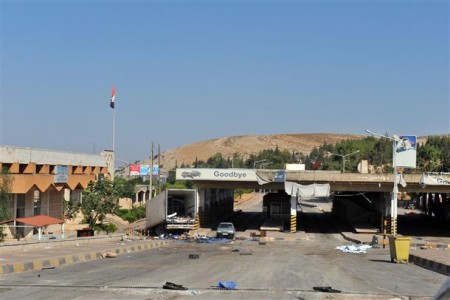PHOTO: The Bab al-Hawa crossing with Turkey, controlled by rebels since 2012
Abdurrahman Alharkosh, a citizen journalist near Damascus, writes for EA:
On Tuesday, the Syrian opposition announced that the Bab al-Hawa crossing on the Turkish border, held by rebels since 2012, had finally been handed over to civilian administration. Photographs showing the processing of passport and immigration applications. At the same time, Turkey continued to maintain its closure of the border since early March, allowing only commercial and emergency medical vehicles to pass.
The development points to the wider issue of control along the 822 km (500 miles) of Syrian-Turkish frontier, where nine crossings are now split among the Assad regime, rebel forces, the Islamic State, and Kurdish groups. Those crossings tell the story of the politics and military contest since the 2011 uprising.
For example, they have been a marker of Turkey’s estrangement from the Assad regime, and corresponding support for the opposition. The sympathy of Turkish leader Recep Erdoğan for the challenge to President Assad was reinforced by blame on the regime for failing to maintain security at its crossings on Turkey’s border. The Turks closed both the Kassab and Qamishli crossings in spring 2013 after a car bomb in Reyhanli in southeast Turkey killed 51 people. Ankara said that the car used in the attack had entered through the Kassab crossing.
The crossings are also a marker of Turkey’s relationship with the Islamic State. As the fight began between rebel factions and the Islamic State began in January 2014, the militants drove rebels out of the Jarablus and Tal Abyad crossings, north of the city of Raqqa. Turkey soon shut the two crossings, depriving the Islamic State of important revenues. The Turkish decision did not change, even though the militants repeatedly told Ankara that it would hand the posts to local civil bodies.
The situation has shifted further with the rise of the Kurdish militia YPG, affiliated to Turkey’s Kurdish movement PKK, as the Syrian Kurds took control of three smaller crossings in the towns of Kobani, Ras Alayn, and Ayn Diwar last year. Until recently, Turkey allowed individuals to cross the frontier — with more than 200,000 displaced Syrians moving across the border as the Islamic State attacked Kobane in autumn 2014 — but it banned any movement of goods. Kurdish activists also reported frequent complete closures of the three crossings.
Back in northwest Syria, the rebel-held crossings of Bab al-Hawa and Bab al-Salama are likely to be the focus of attention this spring. The two points, as well as smuggling passages, have been the main access to Turkey for hundreds of thousands of people fleeing regime bombardment and deprivation since 2012. They have also been increasingly important for essential goods, as the war in Syria has paralyzed industry and crippled agriculture.
With the handover to civilian administration and protection by the Ahrar al-Sham faction, rebels will be hoping to persuade Turkey that they re-open a secure crossing to movement of people and supplies.
With Ankara and Saudi Arabia stepping up support for the rebels in their campaigns in northwest Syria, that approach has a chance of success. At the same time, Turkey will be looking for reassurances that there will be no repetition of the 2013 car bombings. It may also be cautious, given the Assad regime’s repeated allegations of support of “terrorists”, about the timing of any re-opening.
The Turkish frontier has long been lost to the Assad regime. The question now becomes if any of the other movements — the rebels, the Kurds, and/or the Islamic State — will “win” in the contest for the border.

